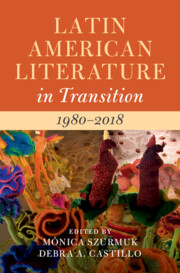Book contents
- Latin American Literature in Transition 1980–2018
- Latin American Literature in Transition
- Latin American Literature in Transition 1980–2018
- Copyright page
- Contents
- Contributors
- Acknowledgments
- Introduction
- Part I Security
- Part II New Genres
- Chapter 5 Speculative Fiction
- Chapter 6 Latin American Digital Literature
- Chapter 7 Children’s Literature in Latin America from School to Marketplace and Beyond
- Chapter 8 Paraliterature
- Chapter 9 Performance Studies
- Chapter 10 Graphing a Hemispheric History of Latinx Comics Creation
- Chapter 11 New Poetry, Fresh Approaches
- Part III Mobilities
- Part IV Positionalities
- Part V Latin American Literature in Global Markets
- Index
- References
Chapter 8 - Paraliterature
from Part II - New Genres
Published online by Cambridge University Press: 24 November 2022
- Latin American Literature in Transition 1980–2018
- Latin American Literature in Transition
- Latin American Literature in Transition 1980–2018
- Copyright page
- Contents
- Contributors
- Acknowledgments
- Introduction
- Part I Security
- Part II New Genres
- Chapter 5 Speculative Fiction
- Chapter 6 Latin American Digital Literature
- Chapter 7 Children’s Literature in Latin America from School to Marketplace and Beyond
- Chapter 8 Paraliterature
- Chapter 9 Performance Studies
- Chapter 10 Graphing a Hemispheric History of Latinx Comics Creation
- Chapter 11 New Poetry, Fresh Approaches
- Part III Mobilities
- Part IV Positionalities
- Part V Latin American Literature in Global Markets
- Index
- References
Summary
This chapter traces a path from the literary canonization of traditional forms of paraliterature, such as detective fiction and science fiction, to Latin American authors’ recent engagement with extraliterary reading practices. It also expands the definition of paraliterature to include widely disseminated informational and regulatory texts not typically considered literary, such as encyclopedias and state-administered exams, and examines paraliterature’s intersections with the avant-garde. Using a theoretical framework centered on Latin American ideas of engaged and “postautonomous” literature, this chapter first examines the embrace of popular categories of genre fiction by literary writers and then turns to autofictional, testimonial, and pseudo-referential works that cross boundaries between literature and the real. Through works from canonical authors such as Roberto Bolaño, Horacio Castellanos Moya, and Diamela Eltit, as well as younger writers such as Verónica Stigger, Ricardo Lísias, and Ena Lucía Portela, this chapter addresses ways in which contemporary fiction and poetry intersect with their sociopolitical contexts and call into question the limits and purposes of literary writing and reading practices.
- Type
- Chapter
- Information
- Latin American Literature in Transition 1980–2018 , pp. 123 - 138Publisher: Cambridge University PressPrint publication year: 2022



